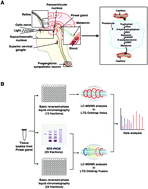Characterization of human pineal gland proteome†
Abstract
The pineal gland is a neuroendocrine gland located at the center of the brain. It is known to regulate various physiological functions in the body through secretion of the neurohormone melatonin. Comprehensive characterization of the human pineal gland proteome has not been undertaken to date. We employed a high-resolution mass spectrometry-based approach to characterize the proteome of the human pineal gland. A total of 5874 proteins were identified from the human pineal gland in this study. Of these, 5820 proteins were identified from the human pineal gland for the first time. Interestingly, 1136 proteins from the human pineal gland were found to contain a signal peptide domain, which indicates the secretory nature of these proteins. An unbiased global proteomic profile of this biomedically important organ should benefit molecular research to unravel the role of the pineal gland in neuropsychiatric and neurodegenerative diseases.


 Please wait while we load your content...
Please wait while we load your content...